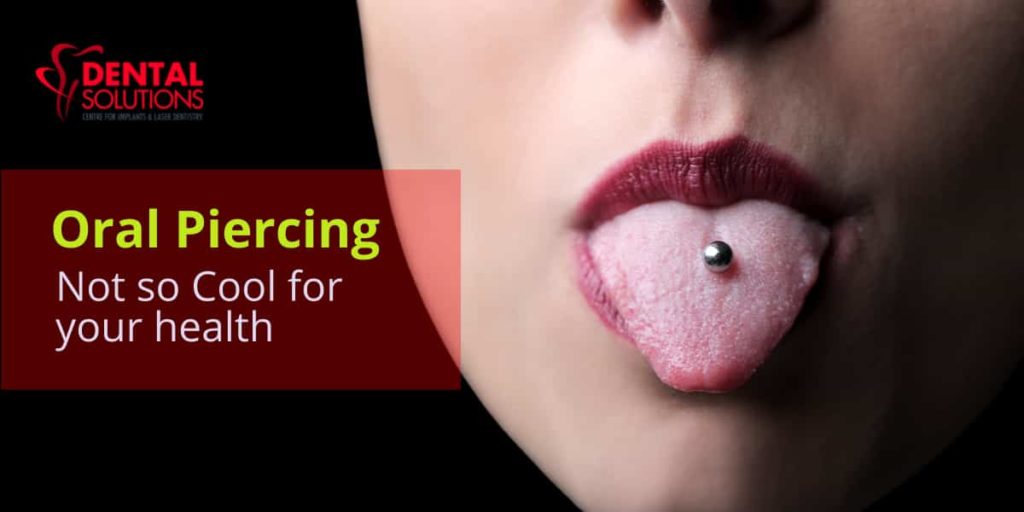- +917892951808
- Indiranagar, Bangalore
Best Dental Clinic In Bangalore Indiranagar | Best Dentist in Bangalore Indiranagar
- Home
- About Us
- Treatments
- Blog
- Contact Us
Oral Piercings – Not so cool for your health

Oral Piercings and your health
An oral or mouth piercing is a small piercing in the tongue, lip, cheek, or uvula (teardrop-shaped soft tissue that hangs down the back of your throat.) where you can wear jewellery. Many get these piercings as a form of self-expression, or as part of their culture or something they are passionate about. As of today, there has been an increasing demand from adolescents and young people for oral piercings that has generated concern within the dental fraternity regarding the risk posed from this type of piercing. If you're thinking about getting an oral piercing, you may want to be well educated and aware about the relationship between oral piercings and oral health. If you already have an oral piercing, you must know more about how you can maintain and care for your oral health. The most common immediate complications following an oral piercing is pain and swelling of the site of the piercing, which in severe cases affects breathing, especially in cases with tongue piercing. You may experience trouble eating and speaking immediately after placing the oral jewellery, although temporary could cause further problems if the mouth is not well adjusted to it.Risks Involved with Oral Piercings
- Infection and swelling: Our mouth has a moist environment and is home to huge amounts of breeding bacteria, therefore, an ideal place for infection. When this bacterium gets into the piercings, it can lead to infection. The infection can spread quickly if left untreated and at times can become life threatening! Constantly touching the jewellery with your hand, fiddling with the piercings using other objects or the use of tobacco products, can increase your risk of infection. Oral piercings can also injure gums and lead to cracked or sensitive teeth. There are cases where-in piercings have been known to damage tooth fillings.
- Tooth Fracture: This is the most common problem associated with oral piercings – Chipping or fracture to the teeth due to the jewellery. This is even more worrisome when you have oral fittings such as crowns or caps, as they are more vulnerable to the damage being caused.
- Gingival problems: People with tongue piercings are more likely to develop gingival recession in the lower lingual region than those who do not. Also, the severity of the recession is significantly higher. Gingival recession can produce a poor aesthetic appearance and increase the risk of teeth sensitivity. Lip piercings can cause traumatic damage to the buccal gingiva.
- Abrasion: Rattling the piercings against the teeth can lead to abrasion of tooth surfaces. The permanent loss of tooth structure can occur on various tooth surfaces including outer tooth surfaces or the incisal edges. This can lead to sensitivity and in severe cases damage to the nerve of the tooth.
- Alteration to saliva flow: Oral piercings may cause an increase in saliva flow (hypersalivation) which can cause excessive drooling.
- Ludwig's Angina: This is an infection of the floor of the mouth which involves inflammation of the tissues under the tongue. Most individuals having tongue piercings are prone to Ludwig's Angina
- Bifid tongue: Also known as cleft tongue, it is the splitting of the tongue or a split running lengthwise along the tip of the tongue. It is the result of incomplete fusion of the lateral lingual swellings. However, this can also occur as a result of a complication caused during tongue piercing, although it is very rare.
- Misalignment of dentition: Habits of moving the oral jewellery around in the mouth and in some cases pushing the jewellery between the teeth can result in misalignment of the dentition.
- Nerve damage: After piercing, there could be slight nerve damage that can cause tongue numbness. The injured nerve can affect your sense of taste as well. This is usually temporary but can sometimes be permanent. Additionally, damage to the tongue's blood vessels can cause serious blood loss.
- Cardiac disease: Your mouth is filled with bacteria that can lead to infection and swelling. Individuals already having cardiac disorders need to be extra careful as bacteria can lead to a condition that can damage the heart valves.
- Dental Diagnosis issues: The jewellery can get in the way of dental care by blocking X-rays.
How to Care for an Oral Piercing
If you already have a piercing, or plan on having one despite potential risks, you need to bear in mind that aftercare is of utmost importance to maintain a healthy mouth. Here are a few ways you can follow to take care of your oral health with piercings. Firstly, be sure to see a trained professional who uses sterile instruments for piercing.- Stay away from smoking and chewing tobacco
- Avoid compulsive habits that could infect your piercing, like: Playing with or rotating your jewellery, placing objects in your mouth with sharp edges, placing the temple tips of your spectacles in your mouth, etc.
- When eating or sleeping, you should remove the jewellery. Also, it is advisable to remove your oral jewellery if you play any sports
- Check the tightness of your jewellery This can help prevent you from swallowing or choking on the jewellery, if it becomes dislodged.
- Visit your dentist regularly and remember to brush twice a day and floss daily.
